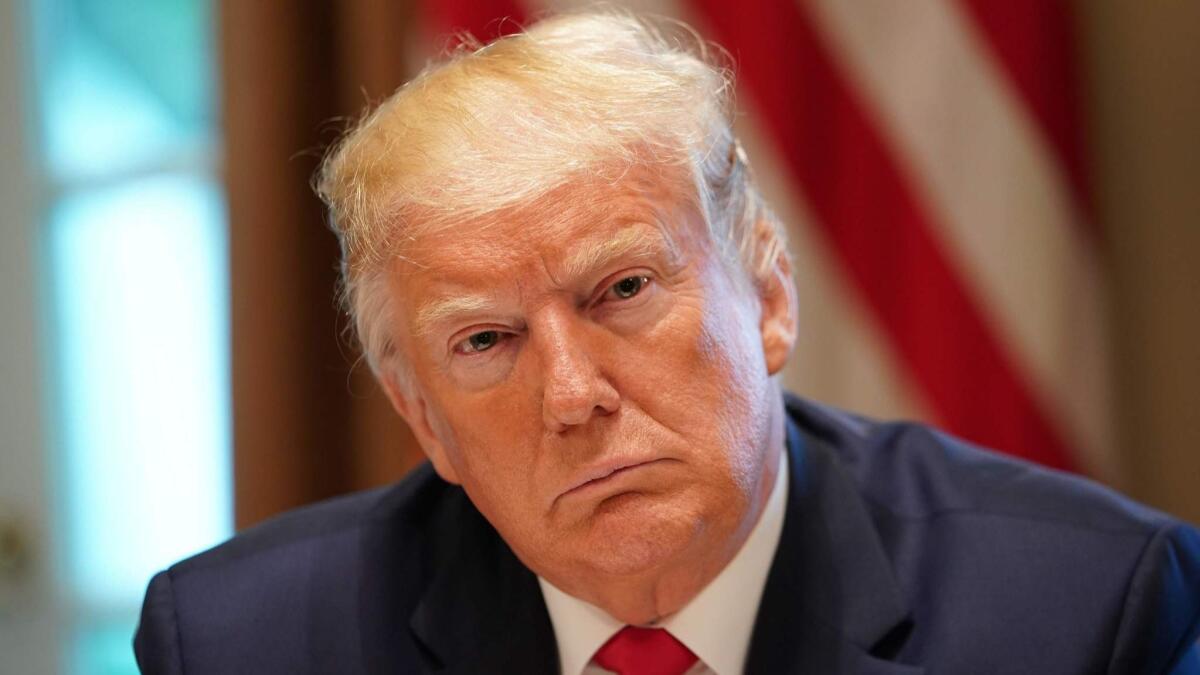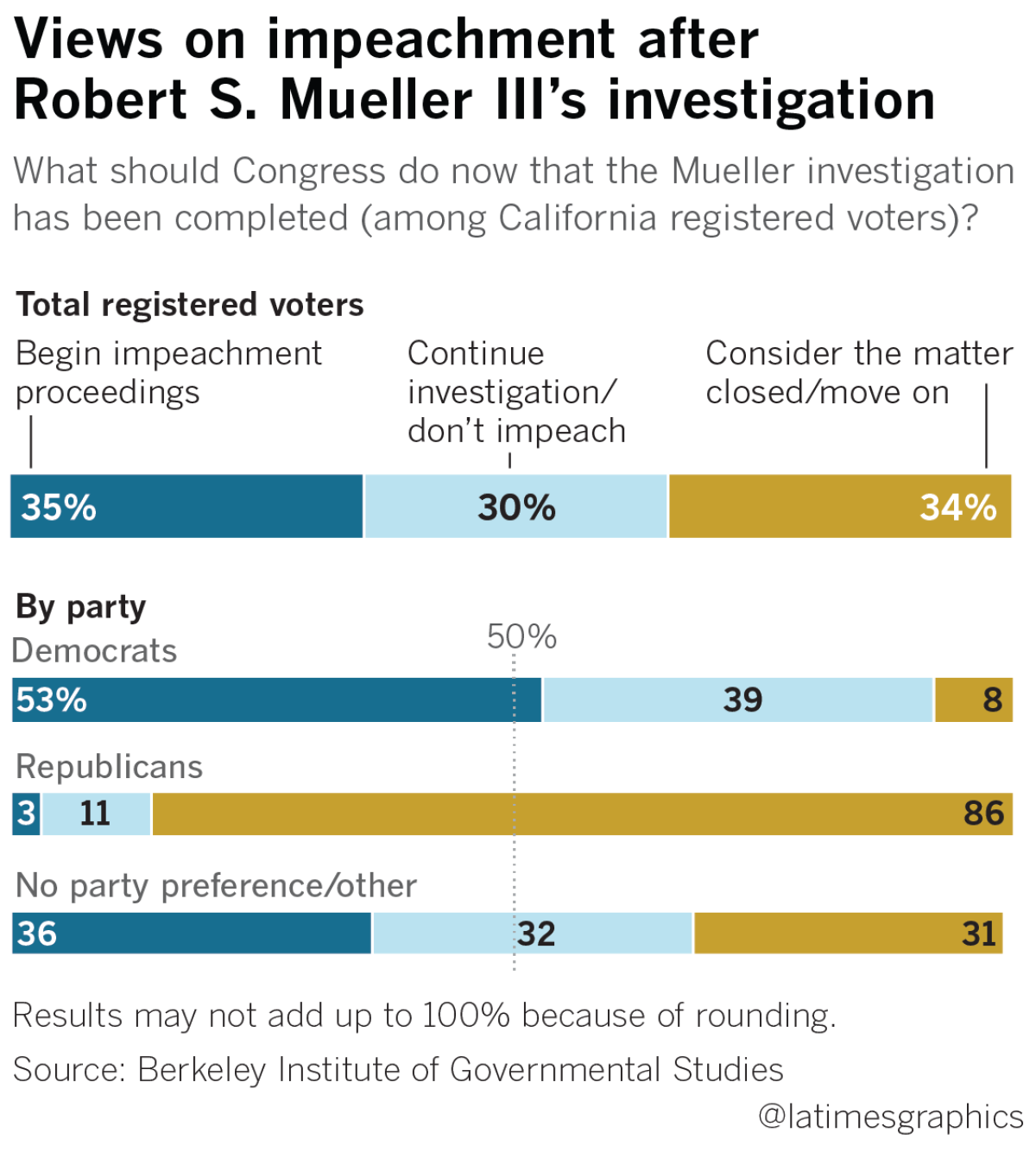Impeach Trump? Many California Democrats aren’t convinced

- Share via
Reporting from Washington — Much like their elected representatives, California Democrats are divided sharply over whether Congress should move to impeach President Trump, a new poll shows.
Trump remains deeply unpopular in the nation’s largest state, with its heavily Democratic electorate, according to the new Berkeley Institute of Governmental Studies poll, conducted for The Times.
More than 6 in 10 Californians — and almost 9 in 10 Democrats in the state — said Trump’s policies have been bad for California. Almost two-thirds of voters in the state said they planned to cast ballots against him in next year’s election.
But when the question turns to impeachment, results are more equivocal, the poll shows.
Among registered voters overall, 35% said Congress should start impeachment proceedings and 30% said Congress should continue investigating Trump, but not start the impeachment process — essentially the position taken by House Speaker Nancy Pelosi of San Francisco. A third said Congress should drop the matter and move to other topics.

A narrow majority of Democrats, 53%, said Congress should start the impeachment process. But about 4 in 10 favored continued investigations. Only about 8% of Democrats said Congress should move on.
Voters registered without a party preference divided almost equally among the three choices. An overwhelming 86% of California Republicans would like to see Congress move to other topics.
“Trump remains hugely unpopular in California and most think his policies are harming the state. Even so, there is no consensus for the Congress to begin impeachment proceedings against the president in this decidedly blue state,” said Mark DiCamillo, who directs the Berkeley IGS poll. That “should serve as a cautionary note to congressional leaders,” he said.
Impeachment has indeed divided House Democrats. A group of about 60 members has pushed Pelosi to open a formal impeachment inquiry, which would be the first step toward potentially voting to impeach. Pelosi has resisted, arguing that Democrats should impeach Trump only if they can persuade a large majority of the country that the evidence clearly requires that move.
Here’s where each California Democrat stands on opening an impeachment inquiry on Trump »
Under the Constitution, if a majority of the House votes to impeach, the Senate then must conduct a trial. The president can be removed from office if two-thirds of the Senate votes to do so. In the current Senate, that would require the unlikely prospect of 20 Republicans voting for conviction, assuming all 47 Democrats and independents backed it.
Two presidents, Andrew Johnson in 1868 and Bill Clinton in 1998, have been impeached, but neither was removed from office. President Nixon resigned in 1974 after the House began impeachment proceedings, but before a formal vote.
In California, support for impeachment runs strongest among the state’s most liberal voters. About two-thirds of those who describe themselves as “very liberal” support opening impeachment proceedings, and about 3 in 10 in that group say Congress should continue investigating.
By comparison, self-described moderates divide almost equally among those who support impeachment, those who back investigating and those who want Congress to turn to other matters.
Backing for impeachment is also stronger among minority voters than among whites and stronger among younger voters than older. Almost half of voters younger than 30 say Congress should move toward impeachment. Among voters 50 and older, support for impeachment drops to about 3 in 10.
Self-described conservatives overwhelmingly say that Congress should move on to other topics. In liberal California, however, that’s very much a minority position.
How the Berkeley IGS poll was conducted »
The division over impeachment, however, does not extend to voting for Trump in next year’s election: Only 26% of the state’s voters said they would “definitely vote to reelect” Trump, while 63% said they would “definitely not vote to reelect.”
The state’s likely vote falls along now-familiar lines: Democrats are united against him, with more than 9 in 10 saying they would definitely vote against Trump.
California Republicans are somewhat less united, but about three-quarters said they would definitely vote for Trump.
The division among California Republicans also appears in how they view next spring’s presidential primary. Just over 4 in 10 of those who intend to vote in the Republican primary said they thought that having a candidate challenge Trump would be a “good thing.”
However, 56% of Republicans said a challenge to Trump would be a “bad thing.” Former Massachusetts Gov. William Weld has said he will challenge Trump for the GOP nomination. Maryland Gov. Larry Hogan has flirted with the idea, as has former Ohio Gov. John Kasich, who ran in 2016.
Are suburbs pushing homeless people into L.A.? Debate rages as numbers spike »
The Republican primary in California is open only to registered Republicans, unlike the Democratic primary, which is open to Democrats and voters who aren’t registered with a party.
The divide among voters over a Trump challenger is mostly ideological: Those who described themselves as “very conservative” opposed a challenger to Trump by 72% to 28%. Those who called themselves “somewhat conservative” were closely divided, and those who labeled themselves as “moderate” or “liberal” favored a challenger, 58% to 42%.
Among California voters as a whole, about two-thirds disapprove of Trump’s performance in office, and one-third approve. That division has remained consistent in Berkeley IGS polls since the spring of Trump’s first year in office.
In addition to feeling that Trump’s policies have been negative for the state, most California voters also say his policies have hurt them and their families. Overall, 56% of voters feel that way, compared with 29% who say Trump’s policies have helped them and 15% who say they have neither helped nor hurt.
The poll surveyed 4,435 registered voters statewide online June 4-10. Of them, 3,328 were considered likely to vote in the general election in November 2020, and 721 were deemed likely voters in the state’s GOP presidential primary on March 3.
The poll results for the full sample of registered voters have an estimated sampling error of roughly 2.5 percentage points in either direction.
More to Read
Get the L.A. Times Politics newsletter
Deeply reported insights into legislation, politics and policy from Sacramento, Washington and beyond. In your inbox three times per week.
You may occasionally receive promotional content from the Los Angeles Times.











